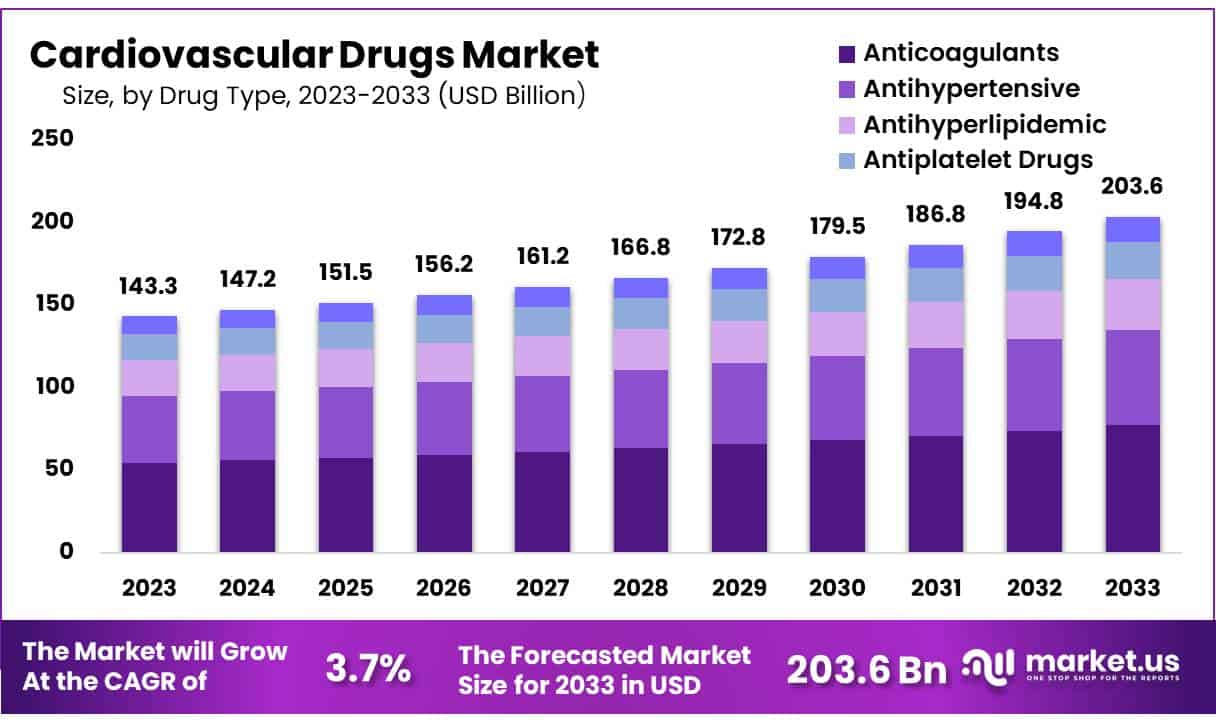New York, NY – June 26, 2025 - The global cardiovascular drugs market is expected to grow from US$ 143.3 billion in 2023 to US$ 203.6 billion by 2033, at a steady CAGR of 3.7%. This growth is mainly driven by the increasing number of people suffering from cardiovascular diseases (CVDs). According to the World Health Organization (WHO), CVDs are the world’s leading cause of death, accounting for over 17.9 million deaths each year. This widespread burden is creating a strong demand for drugs that treat conditions like high blood pressure, heart failure, blood clots, and high cholesterol.
A major factor contributing to this rise is the global aging population. As people age, their risk of developing heart-related conditions increases. The Older adults often require long-term treatment to manage chronic cardiovascular issues. This demographic shift is expected to sustain the market’s demand for effective drug therapies, especially in regions with growing elderly populations.
Lifestyle-related risk factors are also driving the need for cardiovascular drugs. Poor diet, physical inactivity, smoking, and alcohol use have led to higher rates of obesity, hypertension, and diabetes worldwide. According to the CDC, nearly half of U.S. adults live with a form of cardiovascular disease or its risk factors. As these health issues become more common, so does the need for medications to manage symptoms and reduce the chances of severe events like heart attacks or strokes.
Government-led healthcare initiatives are further supporting market expansion. Many countries are improving access to essential medicines and investing in early detection programs. The WHO’s “HEARTS” initiative, for example, aims to strengthen cardiovascular care in low- and middle-income countries. Programs like these increase awareness and the availability of affordable treatments, especially in underserved regions. This results in a broader reach for drug manufacturers and improves global heart health.
Lastly, advancements in medical research and drug development are fueling market growth. Pharmaceutical companies are creating new drugs with improved effectiveness and fewer side effects. Regulatory agencies such as the U.S. FDA and European Medicines Agency (EMA) are also speeding up approval processes for life-saving cardiovascular drugs. These developments are helping bring innovative treatments to market more quickly, ensuring patients get access to the best available options.

Key Takeaways
- Market Size Overview : An industry expert revealed that the cardiovascular drugs market could reach US$ 203.6 billion by 2033, rising from US$ 143.3 billion in 2023.
- Growth Forecast : According to analysts, the market is set to grow steadily at a 3.7% CAGR between 2024 and 2033, driven by increasing heart-related conditions.
- Top Drug Type : In 2023, anticoagulants emerged as the leading drug type, capturing approximately 38.0% of the total cardiovascular drugs market share.
- Leading Disease Indication : Experts noted that hypertension remained the most treated condition, accounting for a significant 39.5% share in the overall market.
- Preferred Route of Administration : Oral medications led the way in 2023, with a dominant revenue share of 57.7%, favored for their convenience and ease of use.
- Distribution Channel Trends : Retail pharmacies proved to be the primary distribution channel, contributing 40.3% to market revenue due to easy accessibility and broad reach.
Emerging Trends
1. Shift Toward Personalized Medicine
One major trend in heart care is personalized or precision medicine. Doctors now use genetic tests to learn about a person’s risk of heart disease. These tests help find the most effective drugs for each person. The goal is to make treatments safer and more effective. This approach can also lower the chances of side effects. Personalized medicine means that the same treatment is not given to everyone. Instead, care is tailored to the individual. This trend is growing fast as testing becomes easier and cheaper. It helps doctors choose the right drug at the right dose for every patient.
2. Rise in Combination Therapies
More doctors are now using fixed-dose combination drugs for heart care. These pills contain more than one medicine. They are helpful for people with high blood pressure, high cholesterol, or heart failure. Taking one pill instead of many is easier for patients. It also helps them stick to their treatment. This means fewer missed doses. Combination therapy improves results and lowers the risk of hospital visits. It also makes treatment less confusing. These multi-action pills are now a key trend in cardiovascular care. They aim to treat many issues at the same time, in a single dose.
3. Increased Focus on Anti-inflammatory Drugs
Inflammation is now known to play a big role in heart disease. It can damage blood vessels and lead to heart attacks or strokes. Because of this, new drugs are being made to reduce inflammation. These drugs target harmful swelling in the heart and arteries. They may help lower the risk of major heart problems. Anti-inflammatory drugs are now being tested in heart disease patients. This is a shift from just treating blood pressure or cholesterol. Scientists now want to treat the root causes too. These new drugs offer hope for better prevention and care.
4. Biologic Drugs for Cardiovascular Use
Biologic drugs are now being explored for heart care. These are made from living cells and include things like antibodies or proteins. They are already used in cancer and immune diseases. Now, some are being tested for heart conditions. For example, biologics may help lower cholesterol or repair damaged blood vessels. These drugs work in a different way than regular pills. They may offer better results for some patients. Though still in early stages, biologics are a growing trend. They show promise in treating heart disease in new and targeted ways.
5. Digital Tools Supporting Drug Effectiveness
Technology is playing a bigger role in heart treatment. Apps and wearable devices now help people take their medicine on time. These tools can remind patients to take pills or track health data. Some even send updates to doctors. This improves drug use and helps catch problems early. Digital tools also motivate patients to stay on track. They add support outside of the clinic. As more people use smartphones and smartwatches, these tools are becoming common. They help make drug therapy more effective and patient-friendly.
Use Cases
1. Managing High Blood Pressure (Hypertension)
Cardiovascular drugs are often used to treat high blood pressure. This condition can put extra strain on the heart and blood vessels. Medications like ACE inhibitors, beta-blockers, and calcium channel blockers are commonly prescribed. These drugs help relax the arteries and reduce pressure in the blood vessels. Controlling blood pressure is very important. It lowers the risk of strokes, heart attacks, and kidney damage. People with hypertension may need to take these drugs daily. Regular checkups help doctors adjust the dose if needed. Lifestyle changes, like a low-salt diet and exercise, also support better results from the medication.
2. Treating Heart Failure
Heart failure means the heart can't pump blood as well as it should. To manage this, doctors often prescribe medications like diuretics, beta-blockers, and ARBs. Diuretics help remove extra fluid from the body, which eases swelling and breathing problems. Beta-blockers and ARBs reduce the heart’s workload and improve blood flow. These drugs can help patients feel better and stay active. They may also prevent hospital visits. Taking medications regularly is key to managing symptoms. Along with medical treatment, patients are usually advised to reduce salt intake, stay physically active, and monitor their weight daily.
3. Preventing Blood Clots
Blood clots can block blood flow and cause serious problems like heart attacks or strokes. Cardiovascular drugs like anticoagulants (blood thinners) and antiplatelets are used to prevent clots from forming. These medications are commonly given after heart attacks, strokes, or in people with atrial fibrillation. They reduce the risk of having another major event. Common examples include aspirin, warfarin, and newer oral anticoagulants. While they are effective, they can increase the risk of bleeding. That’s why regular monitoring and proper dosage are very important. Patients should inform their doctors about any side effects or other medications they are taking.
4. Lowering Cholesterol Levels
High cholesterol levels, especially LDL (bad cholesterol), can lead to clogged arteries. Cardiovascular drugs like statins help lower these levels. They work by reducing the amount of cholesterol made by the liver. This helps slow down or stop the buildup of plaque in the arteries. In turn, it lowers the risk of heart attacks and strokes. If statins aren’t enough, doctors may prescribe newer drugs like PCSK9 inhibitors. These are usually given as injections and offer strong results. A healthy diet, regular exercise, and quitting smoking can improve the effect of these medications and support heart health.
5. Treating Angina (Chest Pain)
Angina is chest pain caused by reduced blood flow to the heart. It can feel like pressure, tightness, or squeezing in the chest. Cardiovascular drugs such as nitrates, beta-blockers, and calcium channel blockers are used to treat angina. Nitrates help widen blood vessels so more oxygen reaches the heart. Beta-blockers and calcium channel blockers reduce the heart’s demand for oxygen. These drugs help ease the pain and prevent further attacks. People with angina should also avoid stress and heavy meals, and follow a heart-healthy lifestyle. Regular follow-ups help ensure the treatment is working effectively.
Conclusion
In conclusion, the cardiovascular drugs market is growing due to a rising number of heart-related health problems worldwide. More people are living with conditions like high blood pressure, heart failure, and high cholesterol. This is creating strong demand for effective medicines. An aging population, poor lifestyle habits, and greater access to healthcare are also pushing market growth. New drug innovations and digital tools are making treatment easier and more personalized. Governments and health organizations are supporting better care, especially in underserved areas. With continuous research and improved therapies, the market is expected to grow steadily, helping more patients manage their heart health successfully in the coming years.


